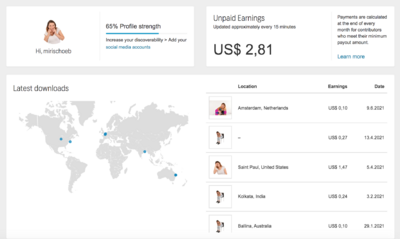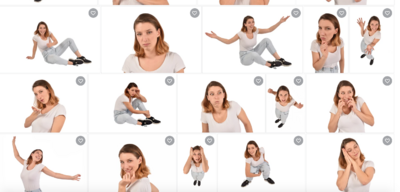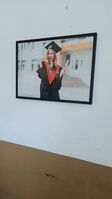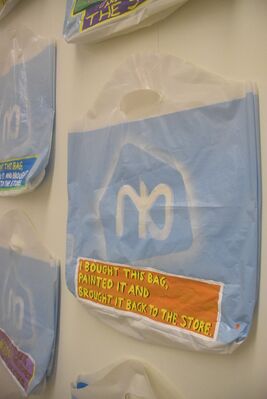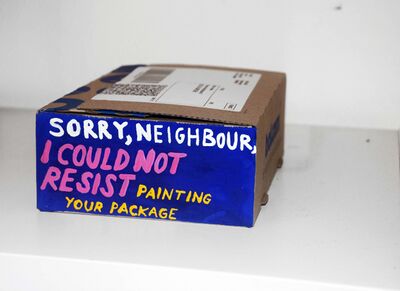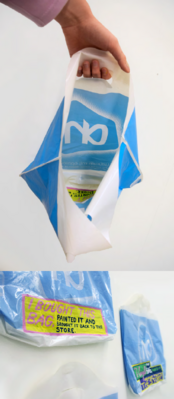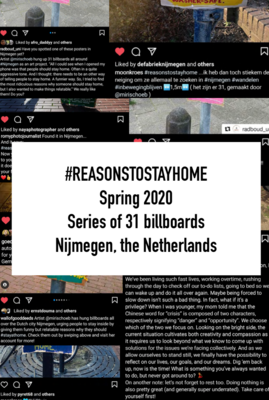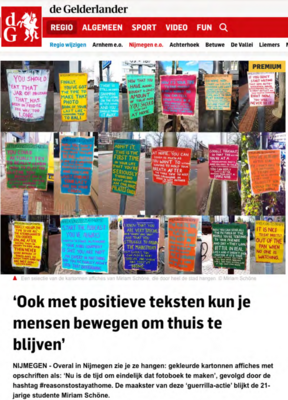Miri's XPUB2 proposal draft: Difference between revisions
Mirischoeb (talk | contribs) |
Mirischoeb (talk | contribs) |
||
| Line 72: | Line 72: | ||
===«I bought this bag, painted it and brought it back to the store»=== | ===«I bought this bag, painted it and brought it back to the store»=== | ||
[[File:Ah bags.jpg|400x400px|frameless]] | [[File:Ah bags.jpg|400x400px|frameless]][[File:Package.jpg|400x400px|frameless]][[File:Bildschirmfoto 2022-10-12 um 15.41.46.png|400x400px|frameless]] | ||
===Video collective «Schild mit Lohn»=== | ===Video collective «Schild mit Lohn»=== | ||
Revision as of 14:42, 12 October 2022
What do you want to make?
I want to research the possibilities of memetic strategies for artistic interventions and the potential of "memefying" daily life. My project should combine my two interest:
Infiltrations of public spaces My whole field of interest and artistic practice is based on the concept of thinking of public spaces as stages, to look at their surroundings, their purposes, and perceive them as a place of open communication. When I say "stage", I do not (only) mean the traditional podium but "stage" as an abstract term for every place of (performative) happenings and actions, whether these are public outdoor and indoor spaces, the medial or the virtual space. I am interested in invading existing and functioning systems with their own rules and rhythms, to examine and criticise these rules and fathoming them out. I like to take things out of a specific context, change them a bit and put them back into their context and look at the outcome. These infiltrations of public spaces can work similar to pranks.
(Internet) Humour As a comedian, I am very interested in how internet humour (as well as humour in general) works, what jokes actually are and how they can open up a political dimension, the role of the context in which the joke is made and how to step into a dialogue with the audience of a stage.
So I want to examine meme patterns and memetic behaviour and translate them to interventions in public spaces (operate artistically in a non-art context). The format is a performative one but the medium is not determined yet. The final project outcome really depends on the intervention I am going to do, it can be one big intervention, a collection of projects or even something like a "handbook to memefy your life". I will do more research and experiments to get a clearer idea. I am also interested in advertising strategies and the language that is commonly used on social media.
How do you plan to make it?
I want to combine doing research and experimenting along the process. The theoretical research will include reading into meme history, internet culture, hacking strategies, media activism and tactical media. For the experimental research: I work a lot with the strategy of imitating things (this can be anything: posters, supermarket items, social media accounts, political campaigns, websites, ...) then changing them a bit and placing them back into their original context. I noticed that this strategy is actually quite similar to the process of replicating memes, so I also want to research this more and find parallels. I know that I work the best when I implement ideas as fast as quickly and then reflect afterwards. My starting point is often a "You know what would be funny?"-approach and then I just do it.
What is your timetable?
October:
- Hackpacts and experiments
- Reading the book "Memes in digital culture" by Limor Shifman
November:
- Hackpacts and experiments
- Reading "The Meme Machine" by Susan Blackmore
- 18 November - Graduate Proposal Deadline
- 18 November - Thesis Outline Deadline
December:
- Know the outcome of the project
- Have finished reading all the main research books by the end of December
- 2 Dec - Deadline First Chapter
January:
- Work on thesis
- Work on project
February:
- Work on thesis
- Work on project
- 17 Feb - Deadline First Draft Thesis
March
- Finish up thesis
- Work on project
- 17 March - Deadline Second Draft thesis
- 31 March - Deadlines Second readers' comments
April
- 14 April - DEADLINE THESIS
- Work on project
April - June
- Finish project
Why do you want to make it?
I have mentioned that I like to think of public spaces as stages. Surely, the obsession with stages also comes from my background as a slam-poet, comedian and performance artist, since next to my studies, I've been performing regularly on podiums for seven years now. My comedy background is inherently connected to my artistic practice since the starting points of my projects often come from trying to find humorous approaches to solve problems in daily life, point out the absurdities in our daily life or to mock the status quo. I am interested in art works that function like a joke, like a punchline, but that – just like good comedy – can open up a political discussion. The topic of how to invade (or in other words: to hack) existing functioning systems keeps me busy. I like to operate artistically in a non-art context and to step into a dialogue with the audience of these stages through my work. Connected with the humorous approach, these infiltrations of public spaces remind me a lot of the concept of pranks and other kinds of internet humor.
Working in all kinds of public spaces fascinates me because it is inherently connected to claiming space back. Every public space is potentially an artistic space and every artistic space is political. How can you grasp and react to a place's political, cultural and national systems of values? To whom belongs space and how do you use it? How do you generate political participation and attention? How can you maybe even initiate social-transformatory processes through artistic interventions? These are questions that interest me in my practice of making things public.
This is also were the fascination of memes comes in. Memes might not be not art works per se but they can be a way of political participation and the space they occupy works as a democratic one. It is interesting to me how memes are based on universal collective humor and a shared knowledge of images as well as as an understanding of how their replication works. This is why I want to research the possibilities of memetic strategies for artistic interventions and the potential of "memefying" daily life.
Who can help you and how?
Teachers that...
- ...know about hacking as an artistic practice
- ...are interested in social media phenomenons, internet humour (especially memes) and pop culture
- ...see the potential of working interdisciplinary beyond categories like art, design or comedy
Maybe other people that...
- ...help me documenting my interventions on camera
- ...give me programming support for publishing online
Relation to previous practice
In my Fine Arts & Design Bachelor, I already worked a lot in public spaces and experimented with the strategy of hacking. Examples I could mention are the following projects:
«US$ 2,81»
«Sorry, neighbour»
«I bought this bag, painted it and brought it back to the store»
Video collective «Schild mit Lohn»
«Reasons To Stay Home»
De Gelderlander: https://www.gelderlander.nl/nijmegen/ook-met-positieve-teksten-kun-je-mensen-bewegen-om-thuis-te-blijven~a30ad0cf/

